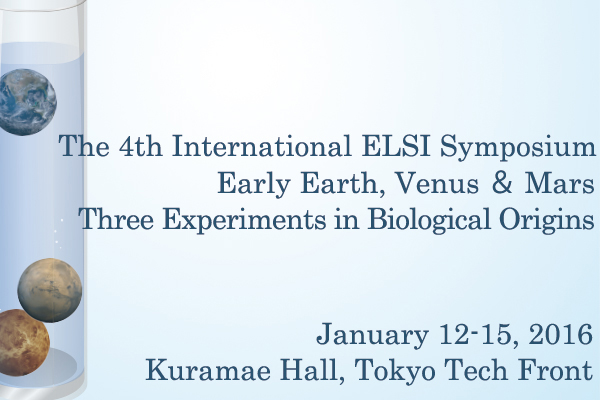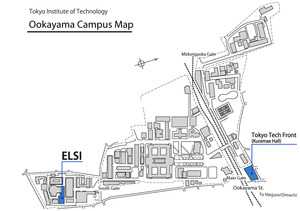Symposium
The 4th ELSI International Symposium
- Date
- January 12, 2016 - January 15, 2016
The 4th ELSI International Symposium
Early Earth, Venus & Mars Three Experiments in Biological Origins
Summary
Full Program
Abstracts for oral presentaions
Program of oral presentations

For declarations of interest, poster contributions, or further information contact:![]()
January 12th - 15th 2016
Kuramae Hall, Tokyo Tech Front, Tokyo Institute of Technology, Tokyo, Japan
In the Solar System, Earth has alone managed to generate and maintain a large active biosphere whose existence greatly altered the subsequent chemical and physical evolution of the planet. Whether its nearest neighbours, Venus and Mars, were temporarily able to do this as well, or were never in a position to accommodate a biosphere of any kind, is largely unknown.
Recently, substantial progress has been made in forming a coherent picture of the early Solar System and planetary formation processes. Also improved is our understanding of the environmental conditions on young planets. Investigation of initial sets of prebiotic chemical systems has also shed new light on the origin and early evolution of life. Now is the time for all this knowledge to coalesce around the concept of the planetary requisite for prebiotic chemical evolution and origination of life.
To crystallise this knowledge is the goal of this symposium. In it we will summarize the formation and early environment of Venus, the Earth and Mars and place them into context relative to each other, and to a lesser degree to other planets and exoplanets. We aim to determine what conditions on Earth were favourable for the onset of chemical cycles that eventually led to a thriving biosphere, and whether our neighbours may have once harboured such conditions. Why did Earth succeed where the others failed?
 Kuramae Hall, Ookayama campus, Tokyo Institute of Technology, next to Tokyo Institute of Technology. The site has easy access to cafés, restaurants, hotels, public transport and other amenities.
Kuramae Hall, Ookayama campus, Tokyo Institute of Technology, next to Tokyo Institute of Technology. The site has easy access to cafés, restaurants, hotels, public transport and other amenities.
Our goal is to host a conference of broad scope with key speakers from around the world, but with targeted impact on key questions and core concepts. We hope to weave a chronological and logical narrative spanning from the early stages of planetary formation, to early planetary environments and to the potential of the Earth, Venus and Mars for hosting a biosphere. We aim to promote discussion and seed long term collaboration amongst the many groups involved.
The meeting will last three and a half days. The first half-day afternoon session features an overview of what is to come. Then, each full day will be organised around a different integrative theme broadly following the chronology from the formation of planets until the last steps preceding the emergence of life. Plenty of time for informal discussion and networking will be provided during lunch and coffee breaks and scheduled discussion sessions. The final afternoon is left open for discussion centred around the question why Venus and Mars are so different from the Earth. Daily themes are:
Three experiments in biological origins: early Earth, Venus and Mars
Each talk is 40 minutes
| Introductory day (Tue 12th) | |
| 14:00 - 14:15 | Kei Hirose, George Helffrich (ELSI, Japan) Welcome and Introduction |
| 14:15 - 15:00 | Shigeru Ida (ELSI, Japan) Introduction to day 1 topics: Planet formation and volatile delivery to terrestrial planets |
| 15:00 - 15:45 | Dave Stevenson (Caltech, USA) Introduction to day 2 topics: The Nature of Planets |
| 15:45 - 16:30 | Norm Sleep (Stanford, USA) Introduction to day 3 topics: Disequilibria and the requirements for (successful) pre-biotic chemistry |
| 16:30 - 16:35 | Instructions to poster presenters |
| 16:35 - 18:30 | Coffee and poster viewing |
| Day 1 (Wed 13th) - The Formation of Venus, Earth and Mars | |
| 09:00 - 09:40 | Colette Salyk (Vassar College, USA) Chemistry in terrestrial planet forming regions of protoplanetary disks |
| 09:40 - 10:20 | Hal Levison (SwRI, USA) The Formation of Terrestrial Planets from the Direct Accretion of Pebbles |
| 10:20 - 10:50 | Coffee |
| 10:50 - 11:30 | Francis Albarede (ENS Lyon, France) Volatility scale, gravitational escape, and abundance of water and volatiles in the Moon and Earth |
| 11:30 - 12:00 | Q&A and discussion Discussion leaders: Shigeru Ida |
| 12:00 - 13:30 | Lunch |
| 13:30 - 14:10 | Bernard Marty (CRPG Nancy, France) Origins and timing of volatile elements on earth and Mars in view of the results of the Rosetta mission |
| 14:10 - 14:50 | Hidenori Genda (ELSI, Japan) Giant impacts and early evolution of terrestrial planets |
| 14:50 - 15:20 | Coffee |
| 15:20 - 16:00 | Kosuke Kurosawa (Chiba Tech, Japan) An atmospheric response against from impact bombardments on Earth and Venus: The role of impact ejecta |
| 16:00 - 16:40 | Patrick McGovern (LPI, USA) The Martian Crustal Dichotomy: an Ancient and Fundamental Feature |
| 16:40 - 17:10 | Q&A and discussion Discussion leaders: Steve Mojzsis |
| 17:10 - 18:30 | Poster viewing |
| Day 2 (Thu 14th) - Planets as Integrated Systems | |
| 09:00 - 09:40 | Victoria Meadows (U Washington, USA) A New Era of Comparative Planetology |
| 09:40 - 10:20 | Yuk Yung (Caltech, USA) Chemistry of the Atmospheres of Planets and Exoplanets |
| 10:20 - 10:50 | Coffee |
| 10:50 - 11:30 | Caroline Dorn (U Bern, Switzerland) Interiors of low-mass exoplanets: what can we learn from observations? |
| 11:30 - 12:00 | Q&A and discussion Discussion leaders: Dave Stevenson |
| 12:00 - 13:30 | Lunch |
| 13:30 - 14:10 | Michael Way (NASA Goddard Institute for Space Studies, USA) Was Venus the first habitable world of our solar system? |
| 14:10 - 14:50 | Axel Kleidon (MPI Jena, Germany) What can thermodynamics tell us about the functioning of the Earth system, its habitability, and its evolution? |
| 14:50 - 15:20 | Coffee |
| 15:20 - 16:00 | Roger Buick (U Washington, USA) Evolution of Earth's biogeochemical nitrogen cycle: an example of an integrated system influencing planetary habitability |
| 16:00 - 17:15 | Q&A and discussion |
| 17:15 - 18:30 | Poster viewing |
| Day 3 (Fri 15th) - Starting Conditions and Requirements for Prebiotic Chemistry | |
| 09:00 - 09:40 | Steve Vance (JPL, USA) TBA |
| 09:40 - 10:20 | Yuichiro Ueno (ELSI, Japan) Disequilibrium of prebiotic atmosphere: C-H-O systems and role of water |
| 10:20 - 10:50 | Coffee |
| 10:50 - 11:30 | Everett Shock (ASU, USA) Geologic Sources of Chemical Disequilibria on Terrestrial Planets |
| 11:30 - 12:00 | Q&A and discussion Discussion leaders: Jim Cleaves |
| 12:00 - 13:30 | Lunch |
| 13:30 - 14:10 | Wolfgang Nitschke (IMM/BIP, France) From thermodynamic disequilibria in alkaline hydrothermal vents to dissipative structures giving birth to life |
| 14:10 - 14:50 | Joseph L. Kirschvink (Caltech-JPL/ELSI, Japan) Are we really from Tharsis? An analysis of the electrochemical environment of early Martian high-altitude glaciers during late Naochian time. |
| 14:50 - 15:20 | Coffee |
| 15:20 - 18:00 | Wrapup discussion "Why?" Discussion leaders: Eric Smith & Steve Mojzsis |
Panel discussion: an attempt to answer the original question of the symposium (Why did only Earth succeed?) and to outline some key questions and directions for research
Brasser, Laneuville, Ueno
Target attendance is around 100 people, with at least 20% students. The goal of presentations is to educate ELSI members and attendees about the latest developments in the many scientific fields that are present, and to foster discussion and multi-disciplinary collaboration. Therefore, not all attendees will give presentations but poster contributions from all will be welcomed with an introduction session before formal viewing.
We look forward to your participation.
 Chair
Chair
George Helffrich
Solid earth geophysics
 Ramon Brasser
Ramon Brasser
Planetary Science
I am interested in the formation and evolution of the Solar System and extrasolar planetary systems. My methods include N-body and solid body dynamics.
 Julien Foriel
Julien Foriel
Isotope geochemistry
 Yuichiro Ueno
Yuichiro Ueno
Biogeochemistry
My research interests center on the early evolution of Earth's biosphere and its interaction with surface environment, especially older than 2.5 billion years (Archean).
 Matthieu Laneuville
Matthieu Laneuville
Geophysics
My focus is the long term evolution of terrestrial bodies: Mercury's contraction history, the asymmetric evolution of our Moon, the deep Earth interior are example of my projects.
 Eric Smith
Eric Smith
Complex Systems
Registration
Registration of participation and poster presentation are now open.
First, create your ELSI account.
To fill out the application form, please go to the following webpage for registration:
http://members.elsi.jp/signup/sympo04?ml_lang=en
Then, go to ELSI website https://members.elsi.jp/ and login with your ELSI User ID you have registered.
Click "4th ELSI International Symposium" at the right column and start registration.
Deadline for participation/poster registration is 14 Dec, 2015
(Due to the limited space available to present posters, we may stop accepting applications earlier).
-----------------------------------
Student Travel Support:
We have limited funding for students to participate in the Symposium and and to initiate collaborations with ELSI members. Visits of up to 4 weeks are possible; longer stays preferred. To apply, please fill out the application and mail to sympo-04info_at_elsi.jp.
We expect to have decisions made by 8 Dec. 2015.
![]()












